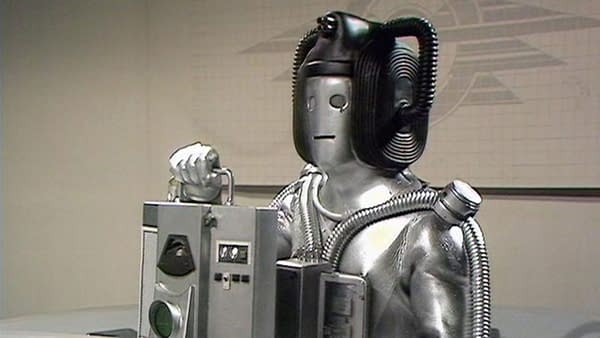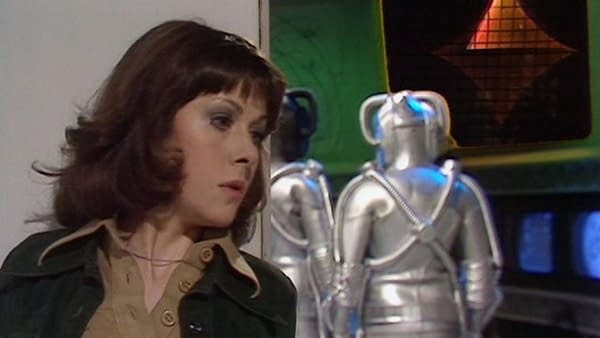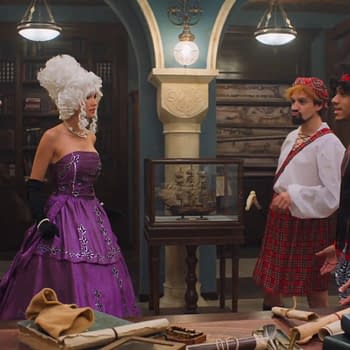Posted in: BBC, Doctor Who, TV | Tagged: cybermen, daleks, doctor who, Revenge of the Cybermen, russell t davies, steven moffat, tom baker
Doctor Who: Here's Why The 70's Wasn't a Great Decade for Cybermen
After weeks of dropping four-minute clips, the BBC finally released a half-hour compilation of the Doctor Who story "Revenge of the Cybermen". This was the Fourth Doctor's (Tom Baker) only Cybermen story in his whole six-year run. It was said that the Third Doctor didn't have any Cybermen stories because star Jon Pertwee didn't like them and vetoed it. Who knows if that's true but fans of shows do love their legends.

It's interesting to look at "Revenge of the Cybermen" not just as an example of 1970s Doctor Who, but as typical 1970s British TV storytelling. The anti-fascist callback to WWII is still present here. The Doctor, Sarah Jane (Elizabeth Sladen), and Harry (Ian Marter) stumble into a human space station in lockdown from an apparent plague that turns out to be a fake-out engineered by the Cybermen. The station orbits the planet Voga whose warring factions mine gold, the one substance lethal to Cybermen. The Cybermen are obvious stand-ins for invading Nazis, with a human collaborator that hammers the WWII analogy.
This was Tom Baker's first season, so he was finding the balance between seriousness and the unpredictable oddness (that would start to go a bit overboard three seasons later) that made him director-proof. "Revenge of the Cybermen" is very far from the best of Doctor Who. The Cybermen act unnecessarily evil when they're supposed to be creatures of old logic, intent only on conquest. Robert Holmes rewrote the script and injected malice into their actions, which pissed off the original writer Gerry Davis, who was the original co-creator of the Cybermen along with the show's scientific advisor Kit Pedler. Why did the Cybermen need to take revenge anyway?
You might laugh at the cheesiness of the production values and actors having to pretend the Cybermat is attacking them, but the cast of stalwart character actors took things seriously and in earnest.

Typically for Old School Doctor Who, there's a lot of to-ing and fro-ing that goes nowhere that does nothing except fill in the runtime of 25-minute episodes before the pay-off in the fourth episode. A lot of time is wasted on the locals distrusting the Doctor and holding him prisoner before finally trusting him. He and his companions are always separated so that's cutting to and from the scenes of them either hiding or joining up with the different factions. And a lot of running up and down corridors. It's Doctor Who 101. You could say the current format of mostly one-and-done 50-minute episodes is mercy and a huge relief.
Then the Cybermen didn't come back till the 1980s. The Fifth Doctor (Peter Davison) had more encounters with the Cybermen with "Earthshock", which is considered a classic story, and they made an appearance in "The Five Doctors". The 6th Doctor (Colin Baker) had a grimdark war story fighting them. The 7th Doctor (Sylvester McCoy) had a decent if repetitive story but Ace (Sophie Aldred) got to kill a couple of them. Russell T. Davies rebooted them for the new show and used them twice in his run. Moffat used them a lot, including in a not-very-good episode written by Neil Gaiman, who was reportedly unhappy with how his script ended up. Moffat had the Cybermen kill the Twelfth Doctor (Peter Capaldi), so that's something. The Cybermen may be considered the Second Doctor's best baddies after the Daleks, but they succeeded where the Daleks never did. Even Chibnall did something interesting with the lone Cyberman struggling with his last shred of humanity.
So where were we? Oh, yes! As far as Doctor Who goes? "Revenge of the Cybermen" actually kind of sucked, but it paved the way for the increasingly better Cybermen stories for the next decades.












